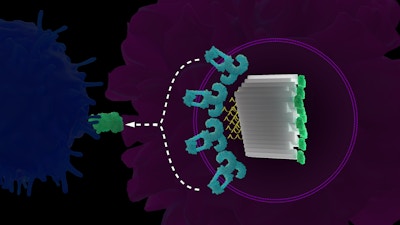- DNA nanoparticles enable precise placement of cargoes including adjuvants and off-the-shelf or patient-specific tumor antigens
- Demonstrated preclinical efficacy in several different mouse tumors models such as melanoma, lymphoma, colon cancer, lung cancer, and neuroblastoma
- Applicable to cancer, autoimmune diseases, and infectious diseases

DoriVac: DNA Origami-Based Vaccines for Combination Immunotherapy
Personalized immunotherapy platform harnessing DNA nanotechnology to co-deliver drug combinations with nanoscale precision
Want to learn more about DoriVac?
We are currently looking for funding opportunities, and collaborative partners in academia and industry.
Molecular Robotics
Want to learn more about DoriVac?
We are currently looking for funding opportunities, and collaborative partners in academia and industry.
The Problem
Serious diseases like cancer and autoimmune conditions require multiple drugs to treat and manage them, but combining drugs is challenging for a number of reasons. The primary problem is toxicity, as the side effects of multiple drugs can compound each other and produce much greater patient suffering than either drug alone – sometimes to the point that the combination is too dangerous to give to a patient, denying them the treatment they need. In addition, combining individual high-dose drugs leads to increased costs for patients and insurers.
One area in which this issue is significantly limiting progress is personalized immunotherapy, such as cancer vaccines. These vaccines typically present two types of molecules to antigen-presenting cells (APCs): tumor antigens, which are protein fragments derived from a patient’s tumor cells, and adjuvants, which stimulate a broad immune response. While both the antigen and the adjuvant need to be delivered to APCs, it is yet unknown how these molecules might interact with each other when co-delivered, or how to optimize the process and the dosages to produce the strongest anti-cancer response.
Our Solution
DoriVac is a DNA origami platform that enables the precise spacing and geometrical arrangement of molecules, including adjuvants and antigens, on nanoparticles to produce highly effective and personalized immunotherapies. Wyss researchers have used the DoriVac platform to identify molecular patterns that produce superior immune responses while minimizing the amount of drugs required, reducing both costs and off-target side effects. DoriVac also has numerous advantages over other nanoparticle platforms, including targeting to specific compartments within cells and co-delivering multiple types of molecules to desired targets at the lowest possible doses.
In vitro studies revealed a configuration of adjuvants that optimized presentation and cross-presentation of antigens by APCs and subsequent activation of CD4+ T helper and CD8+ T effector cells against tumors. In mouse models, the same configuration resulted in the strongest tumor-inhibiting responses, also synergizing with a clinical stage checkpoint inhibitor for an overall improved immunotherapy outcome. Preclinical studies have demonstrated efficacy against melanoma, lymphoma, colon cancer, lung cancer, neuroblastoma, SARS-CoV-2, HIV, and Ebola. DoriVac holds immense promise to revolutionize drug development by delivering multiple modalities of cargos with nanoscale precision, effectively targeting specific cellular compartments while minimizing the required dosage.
Product Journey
The DoriVac platform was developed in the team of Wyss Core Faculty member William Shih, Ph.D. and co-initiated by Ju Hee Ryu, Ph.D. at the Korea Institute of Science and Technology. In 2022 and 2023, DoriVac was selected as a Wyss Institute Validation Project and Wyss Institute Project based on its potential as an advanced vaccine platform for improving and developing new immunotherapies.
The DoriVac team was awarded the top prize in Alnylam Therapeutics’ 2022 Alnylam BioVenture Challenge “for their concept of creating breakthrough DNA origami-based immunotherapies to tackle cancer and infectious diseases.” In 2023, DoriVac was named the runner-up of the Harvard Business School New Venture competition, a finalist in the Harvard President’s Innovation Challenge, and won third place in the Boston Chinese Investment Club’s BioVenture roadshow competition.
The DoriVac project is also part of the NIH-funded “Immuno-engineering to Improve Immunotherapy (i3)” Center at Harvard University. Coordinated by the Wyss Institute and including leading cancer immunologists and immune-engineers from the Harvard John A. Paulson School of Engineering and Applied Sciences (SEAS), Dana-Farber Cancer Institute, and Harvard’s Department of Stem Cell and Regenerative Biology, the i3 Center is developing new biomaterials-based approaches to enable anti-cancer immunotherapies for therapy-resistant cancers.
Genetic Engineering & Biotechnology News covered a February 2024 publication, highlighting how DoriVac vaccines were used to better control tumor growth in mice, enabling them to survive significantly longer than control mice. The effects of DoriVac also synergized with those of immune checkpoint inhibitors, a highly successful immunotherapy already widely used in the clinic.
Want to learn more about DoriVac?
We are currently looking for funding opportunities, and collaborative partners in academia and industry.